除了clothes,还有这些词是永远的复数!
名词复数形式

名词复数形式1) 一些成双成对的名词通常只有复数形式,常见的有jeans (牛仔裤)、headphones (耳机)、trousers (裤子)、clothes (衣服)、pants (短裤)、glasses (眼镜)、shoes (鞋子)、sunglasses (太阳镜)、scissors (剪刀)、compasses (圆规)。
这些名词可单独作主语,动词用复数形式,也可用...pair/pairs of修饰,作主语时动词取决于pair的形式。
2)一些食物名词只有复数形式,常见的有noodles, vegetables, snacks。
3) 一些固定短语中的名词只有复数形式,常见有的express one's thanks to sb. (向某人表达感激之情), a letter of thanks (一封感谢信), in high/low spirits (情绪高涨/低落), have sports (进行体育活动)。
4) 一些不可数名词只有复数形式,但却表示单数概念,常见的有news (消息), means (手段)。
As we all know, no news is good news. 众所周知,没有消息就是好消息。
小学英语名词单复数变化一、名词复数的规则变化1)一般情况加s.eg: map-maps bag-bags car-cars2)以s,sh,ch,x等结尾的词加es.az@22U C ZZeg:bus-buses watch-watches3)以ce,se,ze,(d)ge等结尾的词加seg: license-licenses4)以辅音字母y 结尾的词变y 为i再加eseg: baby---babies5)以o结尾(1)辅音字母加o结尾名词的加-es如tomato-tomatoes(西红杮)potato-potatoes(土豆)(2) 元音字母加o结尾名词的加-s如piano-pianos (钢琴), zoo-zoos(动物园)photo-photos (照片), kangaroo-kangaroos(袋鼠)kilo-kilos(千克)注意zero 两种方式都可:zero-zeros或zeroes(零)二、名词复数的不规则变化1)child---children foot---feet tooth---teethmouse---mice man---men woman---women注意:与man 和woman构成的合成词,其复数形式也是-men 和-women。
只有复数形式的名词

1) 一些成双成对的名词通常只有复数形式,常见的有jeans (牛仔裤)、headphones (耳机)、trousers (裤子)、clothes (衣服)、pants (短裤)、glasses (眼镜)、shoes (鞋子)、sunglasses (太阳镜)、scissors (剪刀)、compasses (圆规)。
这些名词可单独作主语,动词用复数形式,也可用...pair/pairs of修饰,作主语时动词取决于pair的形式。
2)一些食物名词只有复数形式,常见的有noodles, vegetables, snacks。
3) 一些固定短语中的名词只有复数形式,常见有的express one's thanks to sb. (向某人表达感激之情), a letter of thanks (一封感谢信), in high/low spirits (情绪高涨/低落), have sports (进行体育活动)。
4) 一些不可数名词只有复数形式,但却表示单数概念,常见的有news (消息), means (手段)。
As we all know, no news is good news. 众所周知,没有消息就是好消息。
5) 一些专有名词只有复数形式,但却表示单数概念,常见的有:the United States (美国)、the United Nations (联合国)、the United Kingdoms (英国)、the Arabian Nights (《一千零一夜》)。
可数名词单数变复数规律

可数名词单数变复数规律:1、词尾直接加s型:students, apples, bags, trees, books, brothers2、以s、x、sh、ch结尾的名词加es型:glasses, boxes, brushes, matches3、以辅音字母加y结尾的名词,变y为i加es型:city-cities, baby-babies4、以元音字母加y结尾的名词,直接加s: boys, toys5、以f或fe结尾的名词,多数变f为v加es: wives, knives, thief, life, half, leaf, shelf, wolf, 除了roof6、以o结尾的名词,一般直接加s: radios, zoos, pianos, photos;除了5个特殊的词需要加es: Negroes, heroes, potatoes, tomatoes,mangoes.(黑人英雄爱吃土豆和西红柿:薯条蘸番茄酱;最后再吃点芒果)7、不规则变化的词:foot→ feet, goose→ geese, tooth→ teeth,man→ men, woman→ women, sh ee p→ sheep, deer→deerChinese→Chinese, Japanese→Japanese,child→ children,mouse→ mice.不规则变化要特别记,oo常常变ee, foot→feet是一例;男人、女人a改e, woman→women是一例;child复数children要记准,中、日、鹿、绵羊无变化,单数、复数是一家。
第三人称单数(他,她,它)是除了你、我,还有复数以外(他们,她们,它们)的人称。
英语中的不可数名词水纸锻炼信息新闻食物水果羊肉牛肉 10. snow雪鸡肉沙拉家务果汁冰冻食品16,tea茶废物粉雨水风头发米饭人口面包牛奶可乐钱果酱蜂蜜巧克力鱼肉肉空间34. advice 建议墨水盐蛋糕找零家庭作业交通和平愤怒勇气能量恐怖有趣乐趣健康时间沙子天气建议你在学习过程中不断积累。
可数名词单数变复数规律
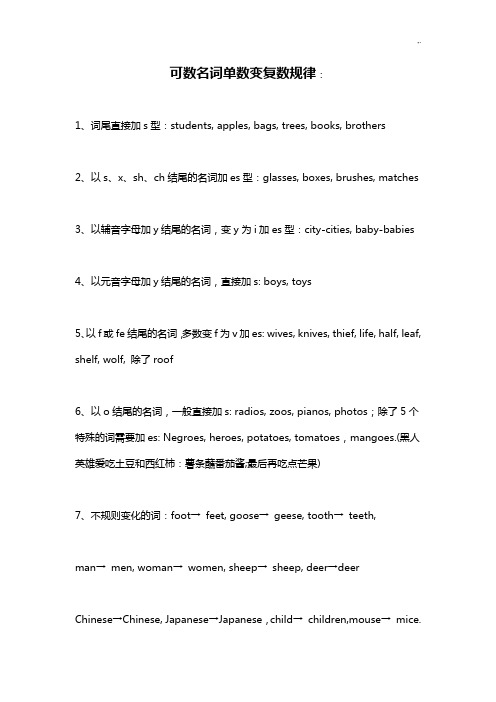
可数名词单数变复数规律:1、词尾直接加s型:students, apples, bags, trees, books, brothers2、以s、x、sh、ch结尾的名词加es型:glasses, boxes, brushes, matches3、以辅音字母加y结尾的名词,变y为i加es型:city-cities, baby-babies4、以元音字母加y结尾的名词,直接加s: boys, toys5、以f或fe结尾的名词,多数变f为v加es: wives, knives, thief, life, half, leaf, shelf, wolf, 除了roof6、以o结尾的名词,一般直接加s: radios, zoos, pianos, photos;除了5个特殊的词需要加es: Negroes, heroes, potatoes, tomatoes,mangoes.(黑人英雄爱吃土豆和西红柿:薯条蘸番茄酱;最后再吃点芒果)7、不规则变化的词:foot→feet, goose→geese, tooth→teeth,man→men, woman→women, sheep→sheep, deer→deerChinese→Chinese, Japanese→Japanese,child→children,mouse→mice.不规则变化要特别记,oo常常变ee, foot→feet是一例;男人、女人a改e, woman→women是一例;child复数children要记准,中、日、鹿、绵羊无变化,单数、复数是一家。
第三人称单数(他,她,它)是除了你、我,还有复数以外(他们,她们,它们)的人称。
英语中的不可数名词1.water 水2.paper 纸3.exercise 锻炼rmation 信息5.news 新闻6.food食物7.fruit水果8.mutton羊肉9.beef牛肉10. snow雪11.chicken 鸡肉12.salad沙拉13.houswork 家务14.juice 果汁15.ice 冰冻食品16,tea茶17.waste废物18.powder 粉19.rain 雨水20.wind 风21.hair 头发22.rice米饭23.population人口24.bread面包k 牛奶26.coke 可乐27.money 钱28.jam 果酱29.honey 蜂蜜30.chocolate 巧克力31.fish鱼肉32.meat 肉33.space 空间34. advice 建议35.ink 墨水36.salt 盐37.cake 蛋糕38.change 找零39.homework 家庭作业40.traffic 交通41.peace 和平42.anger 愤怒43.courage 勇气44.energy 能量45.fear 恐怖46.fun 有趣乐趣47.health 健康48.time 时间49.sand 沙子50.weather天气建议你在学习过程中不断积累。
英语词汇中的名词复数形式有哪些变化规则
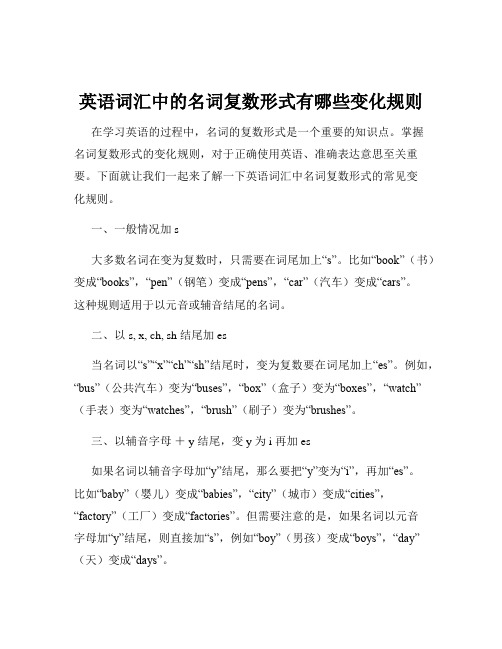
英语词汇中的名词复数形式有哪些变化规则在学习英语的过程中,名词的复数形式是一个重要的知识点。
掌握名词复数形式的变化规则,对于正确使用英语、准确表达意思至关重要。
下面就让我们一起来了解一下英语词汇中名词复数形式的常见变化规则。
一、一般情况加 s大多数名词在变为复数时,只需要在词尾加上“s”。
比如“book”(书)变成“books”,“pen”(钢笔)变成“pens”,“car”(汽车)变成“cars”。
这种规则适用于以元音或辅音结尾的名词。
二、以 s, x, ch, sh 结尾加 es当名词以“s”“x”“ch”“sh”结尾时,变为复数要在词尾加上“es”。
例如,“bus”(公共汽车)变为“buses”,“box”(盒子)变为“boxes”,“watch”(手表)变为“watches”,“brush”(刷子)变为“brushes”。
三、以辅音字母+ y 结尾,变 y 为 i 再加 es如果名词以辅音字母加“y”结尾,那么要把“y”变为“i”,再加“es”。
比如“baby”(婴儿)变成“babies”,“city”(城市)变成“cities”,“factory”(工厂)变成“factories”。
但需要注意的是,如果名词以元音字母加“y”结尾,则直接加“s”,例如“boy”(男孩)变成“boys”,“day”(天)变成“days”。
四、以 o 结尾的名词以“o”结尾的名词,有些加“s”,有些加“es”。
一般来说,有生命的加“es”,无生命的加“s”。
例如,“potato”(土豆)变成“potatoes”,“tomato”(西红柿)变成“tomatoes”,这是有生命的;而“photo”(照片)变成“photos”,“piano”(钢琴)变成“pianos”,这是无生命的。
五、以 f 或 fe 结尾当名词以“f”或“fe”结尾时,通常把“f”或“fe”变为“v”,再加“es”。
比如“leaf”(树叶)变成“leaves”,“knife”(刀)变成“knives”,“wife”(妻子)变成“wives”。
可数名词单数变复数规律
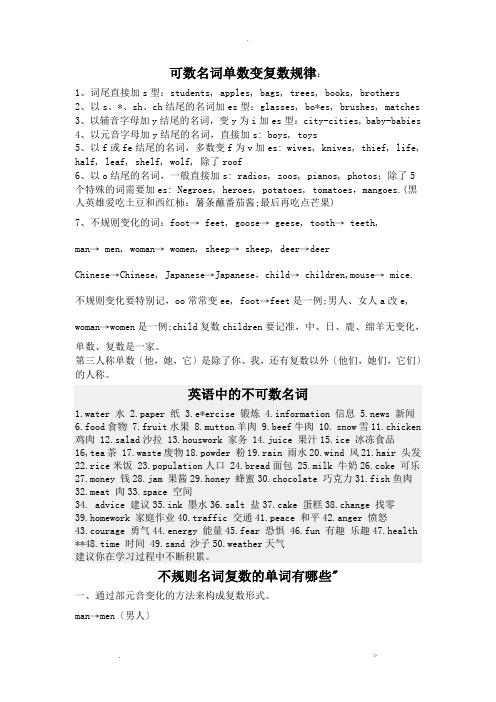
可数名词单数变复数规律:1、词尾直接加s型:students, apples, bags, trees, books, brothers2、以s、*、sh、ch结尾的名词加es型:glasses, bo*es, brushes, matches3、以辅音字母加y结尾的名词,变y为i加es型:city-cities, baby-babies4、以元音字母加y结尾的名词,直接加s: boys, toys5、以f或fe结尾的名词,多数变f为v加es: wives, knives, thief, life, half, leaf, shelf, wolf, 除了roof6、以o结尾的名词,一般直接加s: radios, zoos, pianos, photos;除了5个特殊的词需要加es: Negroes, heroes, potatoes, tomatoes,mangoes.(黑人英雄爱吃土豆和西红柿:薯条蘸番茄酱;最后再吃点芒果)7、不规则变化的词:foot→ feet, goose→ geese, tooth→ teeth,man→ men, woman→ women, sheep→ sheep, deer→deerChinese→Chinese, Japanese→Japanese,child→ children,mouse→ mice. 不规则变化要特别记,oo常常变ee, foot→feet是一例;男人、女人a改e, woman→women是一例;child复数children要记准,中、日、鹿、绵羊无变化,单数、复数是一家。
第三人称单数〔他,她,它〕是除了你、我,还有复数以外〔他们,她们,它们〕的人称。
英语中的不可数名词1.water 水2.paper 纸3.e*ercise 锻炼rmation 信息5.news 新闻6.food食物7.fruit水果8.mutton羊肉9.beef牛肉 10. snow雪11.chicken 鸡肉 12.salad沙拉 13.houswork 家务 14.juice 果汁15.ice 冰冻食品16,tea茶 17.waste废物18.powder 粉19.rain 雨水20.wind 风21.hair 头发22.rice米饭 23.population人口 24.bread面包 k 牛奶26.coke 可乐27.money 钱28.jam 果酱29.honey 蜂蜜30.chocolate 巧克力31.fish鱼肉32.meat 肉33.space 空间34. advice 建议35.ink 墨水36.salt 盐37.cake 蛋糕38.change 找零39.homework 家庭作业40.traffic 交通41.peace 和平42.anger 愤怒43.courage 勇气44.energy 能量45.fear 恐惧 46.fun 有趣乐趣47.health **48.time 时间 49.sand 沙子50.weather天气建议你在学习过程中不断积累。
英语语法:只能用复数的名词
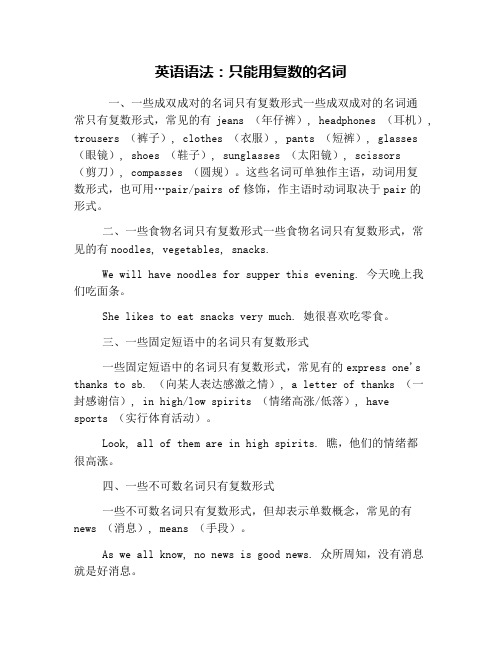
英语语法:只能用复数的名词一、一些成双成对的名词只有复数形式一些成双成对的名词通常只有复数形式,常见的有jeans (年仔裤), headphones (耳机), trousers (裤子), clothes (衣服), pants (短裤), glasses (眼镜), shoes (鞋子), sunglasses (太阳镜), scissors(剪刀), compasses (圆规)。
这些名词可单独作主语,动词用复数形式,也可用…pair/pairs of修饰,作主语时动词取决于pair的形式。
二、一些食物名词只有复数形式一些食物名词只有复数形式,常见的有noodles, vegetables, snacks.We will have noodles for supper this evening. 今天晚上我们吃面条。
She likes to eat snacks very much. 她很喜欢吃零食。
三、一些固定短语中的名词只有复数形式一些固定短语中的名词只有复数形式,常见有的express one's thanks to sb. (向某人表达感激之情), a letter of thanks (一封感谢信), in high/low spirits (情绪高涨/低落), havesports (实行体育活动)。
Look, all of them are in high spirits. 瞧,他们的情绪都很高涨。
四、一些不可数名词只有复数形式一些不可数名词只有复数形式,但却表示单数概念,常见的有news (消息), means (手段)。
As we all know, no news is good news. 众所周知,没有消息就是好消息。
五、一些专有名词只有复数形式一些专有名词只有复数形式,但却表示单数概念,常见的有:the United States (美国), the United Nations (联合国), the United Kingdoms (英国), the Arabian Nights (《一千零一夜》)。
注意!这些SAT名词只有复数形式

注意!这些SAT名词只有复数形式SAT语法知识多而杂,然而通过分类记忆,又比较容易掌握。
因为这类题型涉及的搭配往往比较固定,通过练习,能达到绝对正确性。
接下来,文都国际小编将分专题为大家一一详解,小伙伴们可以持续关注。
今天我们来讲一讲只有复数形式的名词。
一、一些成双成对的名词通常只有复数形式常见的有jeans (年仔裤), headphones (耳机), trousers (裤子), clothes (衣服), pants (短裤), glasses (眼镜), shoes (鞋子), sunglasses (太阳镜), scissors (剪刀), compasses (圆规)。
这些名词可单独作主语,动词用复数形式,也可用…pair/pairs of修饰,作主语时动词取决于pair的形式。
二、一些食物名词只有复数形式常见的有noodles, vegetables, snacks.We will have noodles for supper this evening. 今天晚上我们吃面条。
She likes to eat snacks very much. 她很喜欢吃零食。
三、一些固定短语中的名词只有复数形式一些固定短语中的名词只有复数形式,常见有的express one's thanks to sb. (向某人表达感激之情), a letter of thanks (一封感谢信), in high/low spirits (情绪高涨/低落), have sports (进行体育活动)。
Look, all of them are in high spirits. 瞧,他们的情绪都很高涨。
四、一些不可数名词只有复数形式一些不可数名词只有复数形式,但却表示单数概念,常见的有news (消息), means (手段)。
As we all know, no news is good news. 众所周知,没有消息就是好消息。
哪些名词常用复数.
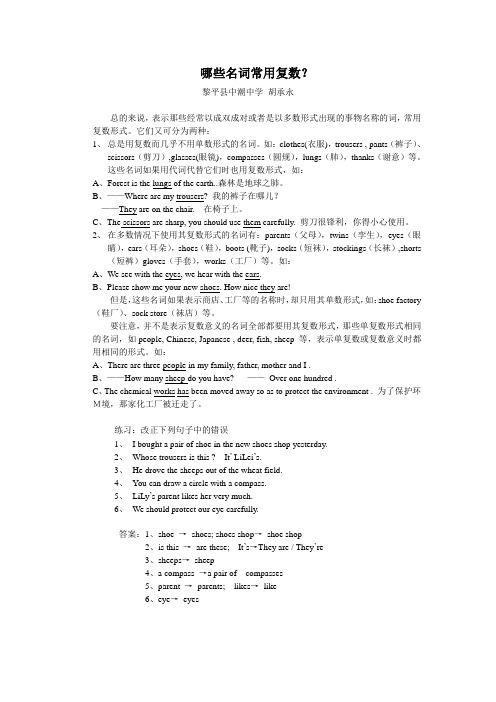
哪些名词常用复数?黎平县中潮中学胡承永总的来说,表示那些经常以成双成对或者是以多数形式出现的事物名称的词,常用复数形式。
它们又可分为两种:1、总是用复数而几乎不用单数形式的名词。
如:clothes(衣服),trousers , pants(裤子)、scissors(剪刀),glasses(眼镜),compasses(圆规),lungs(肺),thanks(谢意)等。
这些名词如果用代词代替它们时也用复数形式,如:A、Forest is the lungs of the earth..森林是地球之肺。
B、——Where are my trousers? 我的裤子在哪儿?——They are on the chair. 在椅子上。
C、The scissors are sharp, you should use them carefully. 剪刀很锋利,你得小心使用。
2、在多数情况下使用其复数形式的名词有:parents(父母),twins(孪生),eyes(眼睛),ears(耳朵),shoes(鞋),boots (靴子),socks(短袜),stockings(长袜),shorts (短裤)gloves(手套),works(工厂)等。
如:A、We see with the eyes, we hear with the ears.B、Please show me your new shoes. How nice they are!但是,这些名词如果表示商店、工厂等的名称时,却只用其单数形式,如:shoe factory (鞋厂)、sock store(袜店)等。
要注意,并不是表示复数意义的名词全部都要用其复数形式,那些单复数形式相同的名词,如people, Chinese, Japanese , deer, fish, sheep 等,表示单复数或复数意义时都用相同的形式。
如:A、There are three people in my family, father, mother and I .B、——How many sheep do you have? ——Over one hundred .C、The chemical works has been moved away so as to protect the environment . 为了保护环M境,那家化工厂被迁走了。
可数名词单数变复数规律
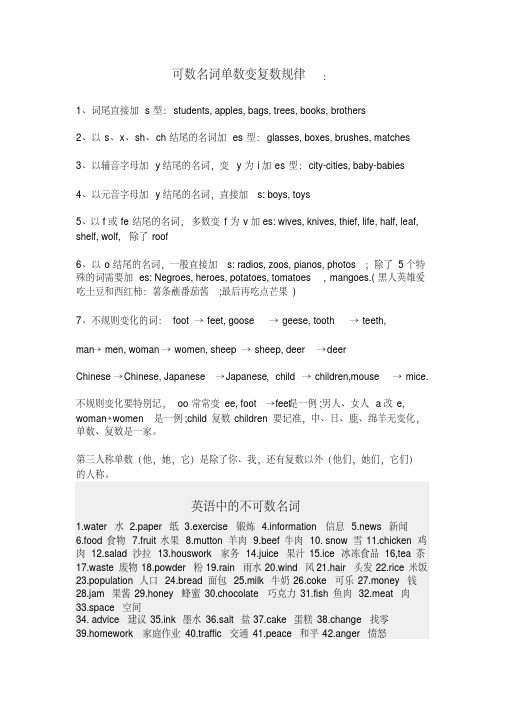
可数名词单数变复数规律:1、词尾直接加s型:students, apples, bags, trees, books, brothers2、以s、x、sh、ch结尾的名词加es型:glasses, boxes, brushes, matches3、以辅音字母加y结尾的名词,变y为i加es型:city-cities, baby-babies4、以元音字母加y结尾的名词,直接加s: boys, toys5、以f或fe结尾的名词,多数变f为v加es: wives, knives, thief, life, half, leaf, shelf, wolf, 除了roof6、以o结尾的名词,一般直接加s: radios, zoos, pianos, photos;除了5个特殊的词需要加es: Negroes, heroes, potatoes, tomatoes,mangoes.(黑人英雄爱吃土豆和西红柿:薯条蘸番茄酱;最后再吃点芒果)7、不规则变化的词:foot→ feet, goose→ geese, tooth→ teeth,man→ men, woman→ women, sheep→ sheep, deer→deerChinese→Chinese, Japanese→Japanese,child→ children,mouse→ mice.不规则变化要特别记,oo常常变ee, foot→feet是一例;男人、女人a改e, woman→women是一例;child复数children要记准,中、日、鹿、绵羊无变化,单数、复数是一家。
第三人称单数(他,她,它)是除了你、我,还有复数以外(他们,她们,它们)的人称。
英语中的不可数名词1.water 水2.paper 纸3.exercise 锻炼rmation 信息5.news 新闻6.food食物7.fruit水果8.mutton羊肉9.beef牛肉10. snow雪11.chicken鸡肉12.salad沙拉13.houswork 家务14.juice 果汁15.ice 冰冻食品16,tea茶17.waste废物18.powder 粉19.rain 雨水20.wind 风21.hair 头发22.rice米饭23.population人口24.bread面包k 牛奶26.coke 可乐27.money 钱28.jam 果酱29.honey 蜂蜜30.chocolate 巧克力31.fish鱼肉32.meat 肉33.space 空间34. advice 建议35.ink 墨水36.salt 盐37.cake 蛋糕38.change 找零39.homework 家庭作业40.traffic 交通41.peace 和平42.anger 愤怒43.courage 勇气44.energy 能量45.fear 恐怖46.fun 有趣乐趣47.health 健康48.time 时间49.sand 沙子50.weather天气建议你在学习过程中不断积累。
可数名词单数变复数规律
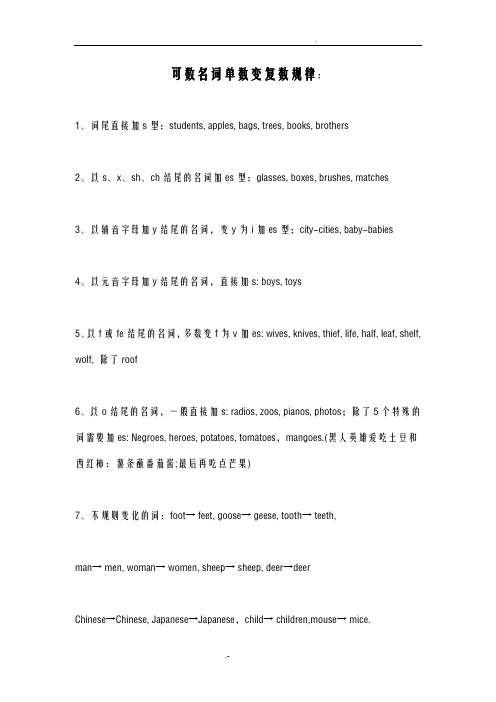
可数名词单数变复数规律:1、词尾直接加s型:students, apples, bags, trees, books, brothers2、以s、x、sh、ch结尾的名词加es型:glasses, boxes, brushes, matches3、以辅音字母加y结尾的名词,变y为i加es型:city-cities, baby-babies4、以元音字母加y结尾的名词,直接加s: boys, toys5、以f或fe结尾的名词,多数变f为v加es: wives, knives, thief, life, half, leaf, shelf, wolf, 除了roof6、以o结尾的名词,一般直接加s: radios, zoos, pianos, photos;除了5个特殊的词需要加es: Negroes, heroes, potatoes, tomatoes,mangoes.(黑人英雄爱吃土豆和西红柿:薯条蘸番茄酱;最后再吃点芒果)7、不规则变化的词:foot→ feet, goose→ geese, tooth→ teeth,man→ men, woman→ women, sheep→ sheep, deer→deerChinese→Chinese, Japanese→Japanese,child→ children,mouse→ mice.不规则变化要特别记,oo常常变ee, foot→feet是一例;男人、女人a改e, woman→women是一例;child复数children要记准,中、日、鹿、绵羊无变化,单数、复数是一家。
第三人称单数(他,她,它)是除了你、我,还有复数以外(他们,她们,它们)的人称。
英语中的不可数名词1.water 水2.paper 纸3.exercise 锻炼rmation 信息5.news 新闻6.food食物7.fruit水果8.mutton羊肉9.beef牛肉10. snow雪11.chicken鸡肉12.salad沙拉13.houswork 家务14.juice 果汁15.ice 冰冻食品16,tea茶17.waste废物18.powder 粉19.rain 雨水20.wind 风21.hair 头发22.rice米饭23.population人口24.bread面包k 牛奶26.coke 可乐27.money 钱28.jam 果酱29.honey 蜂蜜30.chocolate 巧克力31.fish鱼肉32.meat 肉33.space 空间34. advice 建议35.ink 墨水36.salt 盐37.cake 蛋糕38.change 找零39.homework 家庭作业40.traffic 交通41.peace 和平42.anger 愤怒43.courage 勇气44.energy 能量45.fear 恐怖46.fun 有趣乐趣47.health 健康48.time 时间49.sand 沙子50.weather天气建议你在学习过程中不断积累。
哪些名词常用复数.
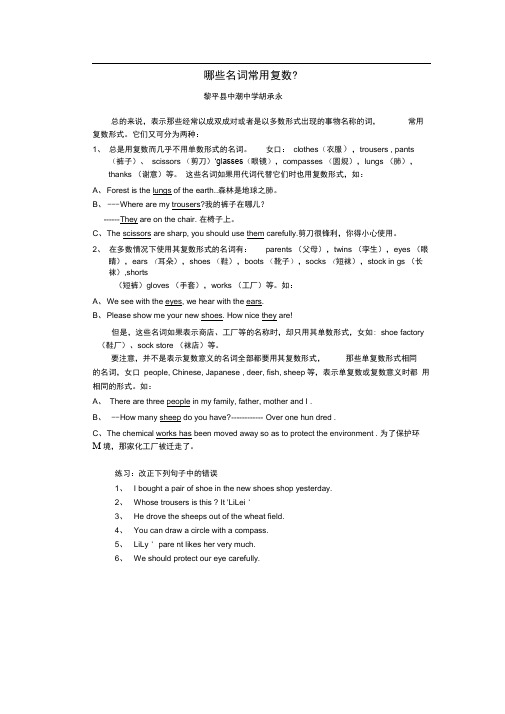
哪些名词常用复数?黎平县中潮中学胡承永总的来说,表示那些经常以成双成对或者是以多数形式出现的事物名称的词,常用复数形式。
它们又可分为两种:1、总是用复数而几乎不用单数形式的名词。
女口:clothes(衣服),trousers , pants(裤子)、scissors (剪刀)‘glasses(眼镜),compasses (圆规),lungs (肺),thanks (谢意)等。
这些名词如果用代词代替它们时也用复数形式,如:A、Forest is the lungs of the earth..森林是地球之肺。
B、--- W here are my trousers?我的裤子在哪儿?------ T hey are on the chair. 在椅子上。
C、T he scissors are sharp, you should use them carefully.剪刀很锋利,你得小心使用。
2、在多数情况下使用其复数形式的名词有:parents (父母),twins (孪生),eyes (眼睛),ears (耳朵),shoes (鞋),boots (靴子),socks (短袜),stock in gs (长袜),shorts(短裤)gloves (手套),works (工厂)等。
如:A、We see with the eyes, we hear with the ears.B、Please show me your new shoes. How nice they are!但是,这些名词如果表示商店、工厂等的名称时,却只用其单数形式,女如: shoe factory (鞋厂)、sock store (袜店)等。
要注意,并不是表示复数意义的名词全部都要用其复数形式,那些单复数形式相同的名词,女口people, Chinese, Japanese , deer, fish, sheep等,表示单复数或复数意义时都用相同的形式。
(完整)以复数形式出现的单词你记住了么

以复数形式出现的单词你记住了么为什么英语中许多单词常常以复数的形式出现呢?经常都记错了!原来有四类平时最常见的以复数形式出现的单词,复习的时候和孩子们讲讲吧.记忆密码1出双入对,讲究对称美!单词指代的物体由两个对等的部分构成。
(1)裤子类相信没有哪位穿裤子是只穿一条腿吧!除非您是独腿大侠,一条腿也可以风驰电掣般地行走。
表示各类裤子的单词有:trousers(裤子,常见于英式英语),pants(裤子,常见于美式英语),underpants(内裤),shorts(短裤),jeans(牛仔裤),leggings(女式紧身裤),flares(喇叭裤),tights(紧身裤)等.(2)眼镜类除了老电影里的搞笑角色,看不到谁只戴一个镜片吧!表示各类眼镜的单词有:glasses(眼镜),sunglasses(太阳镜),binoculars(双筒望远镜),spectacles(眼镜,用于比较正式的场合),goggles(护目镜)等.(3)其他对称类例如:scissors(剪刀),scales(天平),nail—clippers(指甲刀),pliers(钳子),earphones (耳机)。
记忆密码2不可能只有一样东西!以—ing结尾的单词也常常以复数形式出现哦!例如:savings(储蓄),writings(作品),belongings(所有物),doings(行为),findings (调查结果),surroundings(环境)等.储蓄不能只是一块钱吧,所有物不能只是一样东西吧,行为不能只看一件事吧,要在一起才完整哦!记忆密码3好东西,多多益善!有些名词做特定意义讲时常以复数形式出现.例如:contents(目录),arms(武器),fireworks(烟火),congratulations(祝贺),thanks (感谢),goods(货物),clothes(衣服),greens(青菜)等。
以thanks“感谢”为例,虽然动词thank很常见,但是当名词讲时,你不能只给别人一个thank 吧!所以回答别人“How are you?"的提问时,只能用“Fine,thanks.”而不能是“Fine, thank.”记忆密码4固定搭配,木有办法喽!有一些名词在固定的短语搭配中也常常以复数的形式出现。
五个单数同形单词

五个单数同形单词
1、形式为单数,但意义可以用为单数或复数这类集合名词包括family家庭,team(队),class(班),audience(听众)等,其用法特点为:若视为整体,表示单数意义;若考虑其个体成员,表示复数意义。
2、形式为单数,但意义永远为复数这类集合名词包括cattle(牛,牲畜)cattle(,people(人),等,其用法特点为:只有单数形式,但却表示复数意义,用作主语时谓语用复数
3、形式为复数,意义也为复数这类集合名词包括goods(货物),clothes(衣服)等,其用法特点是:只有复数形式,当然也表示复数意义,用作主语时谓语也用复数),但通常不与数词连用。
4、形式为单数,意义也为单数这类集合名词包括
baggage/luggage(行李),clothing(衣服),furniture(家
具),machinery(机器),poetry(诗),scenery(风
景),scenery(),jewelry(珠宝),equipment(设备)等,其用法特点为:是不可数名词,只用单数形式,不用不定冠词(当然更不能用数词),没有复数形式。
5、这些词也是单复数同形:fish鱼,deer鹿,sheep绵羊,works (工厂),means手段,Swiss瑞士人,Chinese中国人mankind(人
类)hair(头发,毛发)fruit(水果)salmon(鲑鱼),cod(鳕
鱼),bison(野牛),clothes(衣服)people美元means手段。
只能用复数的名词

只能用复数的名词一、一些成双成对的名词只有复数形式一些成双成对的名词通常只有复数形式,常见的有jeans (年仔裤), headphones (耳机), trousers (裤子), clothes (衣服), pants (短裤), glasses (眼镜), shoes (鞋子), sunglasses (太阳镜), scissors (剪子), compasses (圆规)。
这些名词可单独作主语,动词用复数形式,也可用…pair/pairs of修饰,作主语时动词取决于pair的形式。
二、一些食物名词只有复数形式一些食物名词只有复数形式,常见的有noodles, vegetables, snacks。
We will have noodles for supper this evening. 今天晚上咱们吃面条。
She likes to eat snacks very much. 她很喜爱吃零食。
三、一些固定短语中的名词只有复数形式一些固定短语中的名词只有复数形式,常见有的express one’s thanks to sb. (向某人表达感激之情), a letter of thanks (一封感激信), inhigh/low spirits (情绪高涨/低落), have sports (进行体育活动)。
Look, all of them are in high spirits. 瞧,他们的情绪都很高涨。
四、一些不可数名词只有复数形式一些不可数名词只有复数形式,但却表示单数概念,常见的有news (消息), means (手腕)。
As we all know, no news is good news. 众所周知,没有消息确实是好消息。
五、一些专出名词只有复数形式一些专出名词只有复数形式,但却表示单数概念,常见的有:the United States (美国), the United Nations (联合国), the United Kingdoms (英国), the Arabian Nights (《一千零一晚上》)。
单复数同形的单词

单复数同形的单词
fish(鱼)、deer(⿅)、sheep(绵⽺)、works(⼯⼚)、means(⼿段)、clothes(⾐服)、scissors(剪⼦)、scales(天平)、glasses(眼镜)、trousers(裤⼦)、police(警察)、cattle(⽜)、livestock(牲畜)。
单复数同形的单词
⼀、Chinese
英 [ˌtʃaɪˈni:z] 美 [tʃaɪˈniz, -ˈnis]
n.中国⼈
The chef, staff and managers are all Chinese.
厨师、⼯作⼈员和经理都是中国⼈。
⼆、cattle
表⽰“⽜群”,故⽤作复数名词。
作主语时,谓语⽤复数形式。
All his cattle were grazing in the field.
他所有的⽜都在地⾥吃草。
三、police
该词通常表⽰“警察部队”,“警⽅”这样的含义,是⼀个集体名词。
The police are investigating the witnesses.
警⽅正在调查⽬击者。
四、poultry
是“家禽”的意思,如鸡、鸭、鹅等。
若指这些活体的动物时,要当作复数名词来⽤。
1、Where are your poultry? 你养的家禽呢?
不过,若表⽰家禽的⾁,则要当作单数名词来⽤。
2、Poultry is harder to come by nowadays than beef.
如今禽⾁⽐⽜⾁难买到。
只能用复数的名词

只能用复数的名词各位读友大家好,此文档由网络收集而来,欢迎您下载,谢谢一、一些成双成对的名词只有复数形式一些成双成对的名词通常只有复数形式,常见的有jeans,headphones,trousers,clothes,pants,gl asses,shoes,sunglasses,scissors,compasses 。
这些名词可单独作主语,动词用复数形式,也可用…pair/pairsof修饰,作主语时动词取决于pair的形式。
二、一些食物名词只有复数形式一些食物名词只有复数形式,常见的有noodles,vegetables,snacks。
wewillhavenoodlesforsupperthisevening.今天晚上我们吃面条。
Shelikestoeatsnacksverymuch.她很喜欢吃零食。
三、一些固定短语中的名词只有复数形式一些固定短语中的名词只有复数形式,常见有的expressone’sthankstosb.,aletterofthanks,inhigh/lowspir its,havesports。
Look,allofthemareinhighspirits.瞧,他们的情绪都很高涨。
四、一些不可数名词只有复数形式一些不可数名词只有复数形式,但却表示单数概念,常见的有news,means。
Asweallknow,nonewsisgoodnews.众所周知,没有消息就是好消息。
五、一些专有名词只有复数形式一些专有名词只有复数形式,但却表示单数概念,常见的有:theUnitedStates,theUnitedNations,theUnit edkingdoms,theArabianNights。
AsfarasIknow,theUnitedNationswassetupin 1925.就我所知的而言,联合国成立于1925年。
六、一些表示庆祝、祝贺的名词只有复数形式一些表示庆祝、祝贺的名词只有复数形式,常见的有:celebrations,congratulations。
- 1、下载文档前请自行甄别文档内容的完整性,平台不提供额外的编辑、内容补充、找答案等附加服务。
- 2、"仅部分预览"的文档,不可在线预览部分如存在完整性等问题,可反馈申请退款(可完整预览的文档不适用该条件!)。
- 3、如文档侵犯您的权益,请联系客服反馈,我们会尽快为您处理(人工客服工作时间:9:00-18:30)。
除了clothes,还有这些词是永远的复数!英语与汉语分属两个不同的语言体系,这种区别虽然给英语学习增添了一些难度,却也为它带来了不少乐趣。
今天英大为大家整理了一些只能用作复数的单词,背后的故事也惊喜多多,一起来学习吧。
Trousers裤子Looking back, to around the 16th century, there was once a singular trouser – or, rather, a singular trouse; the –er form was always plural and may have been modelled on ‘drawers’. You might expect trouse to have originally designated a single leg, in much the manner of sleeve, but this is not the case. A trouse was not a world away from modern day trousers. But at the same time, trouses was used in its plural form for the same object.回首过去,在大约16世纪,人们也曾使用过它的单数形式trouser,那时候也写作trouse。
以-er结尾的名词通常都用复数形式,这可能是受到drawer(抽屉)的影响。
你可能会以为裤子一开始只有一条裤腿,就像sleeve(袖子)一样,但事实却不是这样。
以前的trouse和我们今天的裤子其实也没有什么大不同,都是“紧包臀部和腿部的服装,一直延伸到袜子处”。
复数形式的trousers其实也是指的同一事物。
还有一些表示衣物的词语,它们也经常以复数形式出现,如pants、shorts(短裤)、leggings(紧身裤)、jeans、flares (喇叭裤)、tights(连裤袜/紧身裤)、overalls(工装裤)、dungarees(背带裤)等。
Scissors剪刀The word scissors dates back to the 15th century, and in its first-known uses appeared either as singular or plural. The latter quickly overtook the former in popularity, and today you are only likely to encounter the singular scissor as a verb or used attributively to form a compound noun such as scissor kick.Scissor这个单词可以追溯到15世纪,一开始它的单复数形式都被人们拿来使用。
但后者很快赢得更多的人气,并取代了前者。
今天,只有在scissor作为动词或者作为修饰词来构成复合名词时,如scissor kick(飞踢), 才使用单数形式。
许多其他表示双刃工具的名词也使用复数形式,如pliers(钳子),forceps(医用镊子),shears(修剪花木的大剪刀),tweezers(镊子),tongs(烧瓶钳)。
Glasses眼镜Obviously the singular noun glass exists, but when referring to eyewear, you will only hear about glasses; even the fashion world doesn’t seem yet to have started recommending that people wear a chic glass. The same is true of binoculars, spectacles, and goggles.很显然,glass作为单数名词确实存在,但涉及到眼镜时,你只会听到人们说glasses。
甚至连时尚界人士在推荐眼镜时都不会用a chic(别致的)glass。
同样情况的单词还有binoculars(双筒望远镜)、spectacles(眼镜)、和goggles (护目镜)。
Clothes衣服Looking more broadly in the world of attire, we speak of clothes, but never of a single clothe (a word which exists only as a verb). Cloth exists as a singular noun, but meaning ‘woven or felted fabric, made from wool, cotton,or a similar fibre’, rather than ‘a garment’.放眼服装界,我们通常都说clothes,而不是它的单数形式clothe(该词只在做动词时用单数)。
Cloth作为单数名词,意为“编织或缩绒而成的织物,有羊毛、棉花或类似的纤维制成”,而不是“一件衣服”。
This was not always the case. In the late 14th century,cloth could be used to refer to a single garment, robe, or coat; this use is found in Piers Plowma n, Wycliffe’s translation of the Psalms, and the works of Chaucer.但情况并非总是如此。
在14世纪末期,cloth意为一件衣服、长袍或大衣。
这种用法可以在《农夫皮尔斯》、威克利夫的译作《诗篇》以及乔叟的作品中看到。
Thanks谢谢Although the verb thank is common, especially in the exclamation thank you, you wouldn’t give somebody asingle thank – unless you happened to be in Ancient Britain and using the Old English thanc, from which the modern word stemmed. Again, the singular was dropped eventually – although examples are found as late as the19th century.虽然动词thank 非常普遍,尤其是用在感叹语thank you中。
但是你不能使用它的单数名词形式,除非是在古代英国,古英语中用作thanc,然而它已从现代英语词汇中删除。
虽然直到19世纪还有人使用它的名词单数形式,最终它还是被删除。
Folk人们Although there is also the option of folks (often seen in old folks’ home, for instance), folk is also itself exclusively a plural: in current English, you cannot have one folk. The word dates back to Old English, and is of Germanic origin.虽然也可以加上-s,但folk本身就可以表示复数意义(如old folks’ home养老院)。
在现代英语中,folk一般不表示单数意义。
该词语始于古英语,从日耳曼英语演化而来。
amends 赔偿You can make amends but you cannot make an amend; the latter now exists only as a verb. The noun amends comes from the Old French amendes meaning‘penalties, fine’; in Old French, it was the plural of amende, but only the plural found its way into English.你可以说make amends,却不能说make amend,因为后者现在只用作动词。
名词amends源于古法语amende,意为“处罚,罚款”。
在古法语中,amendes是amende的复数形式,但最终只有amendes被引进到英语中。
Marginalia标注Pluralia tantum don’t necessarily end in ‘s’, of course, particularly if they have kept their plural formation from another or an earlier language. Marginalia –‘notes written in the margins of a te xt’ – comes from Latin, which also had the singular marginalis. The singular did not make its way into English, however, and thus marginalia joins the ranks of pluralia tantum.经常以复数形式出现的名词并不代表着它们一定会以-s结尾,尤其是当它们的复数形式是源于外来语或者早期语言时。
Marginalia意为“文章空白处所做的注释”,源自拉丁语。
它的单数形式为marginalis,却并没有引入到英语中去。
但是,marginalia则成为经常以复数形式出现的名词。
一起的拉丁引进词还有juvenilia(青少年创作的作品)和literati(对文学感兴趣的受过良好教育的人)。
还有一些类似的词语(如paraphernalia{私人物品} 和regalia{特别物品}),虽是单数形式,却表复数意思。
Shenanigans恶作剧Pluralia tantum needn’t be tangible objects; shenanigans is commonly held to be an example. The word is of uncertainorigin, and means ‘secret or dishonest activity or manoeuvring’ or ‘silly or high-spirited behaviour; mischief’. The singular shenanigan is not in common use, and is not included in , but the history of shenanigans actually follows the same pattern as clothes, albeit over a shorter period.经常以复数形式出现的名词并不都是那些有形物体。
